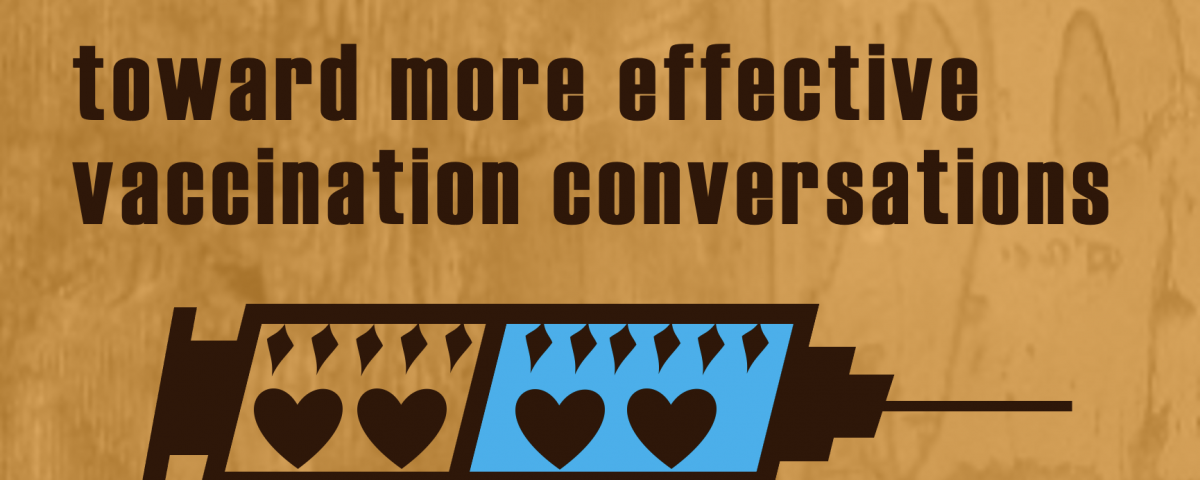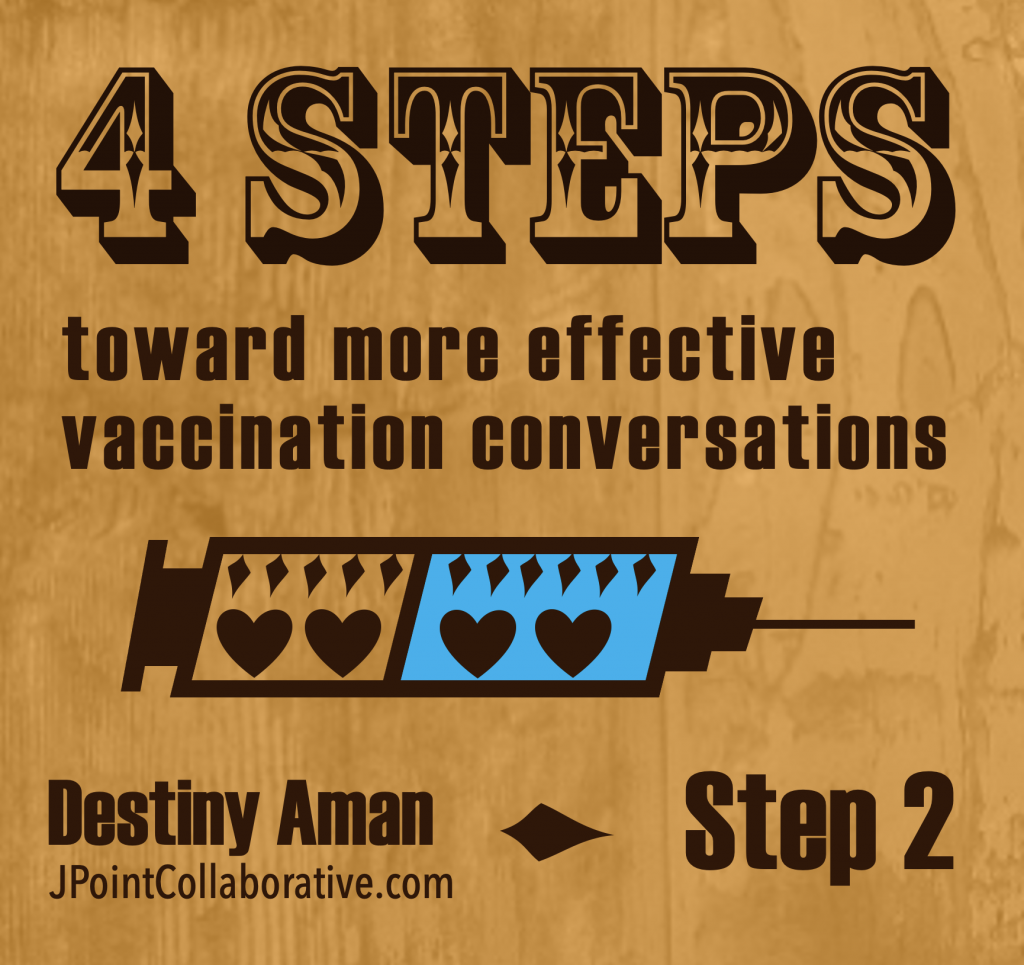Crossing the COVID Vax Divide – Step 2: Identify common ground, and validate that shared common ground.


Destiny Aman, Founder, JPoint Collaborative
This week, following on the heels of a fantastic Air Health Our Health podcast conversation on the topic, we’re digging into how to talk to your friends and family about vaccination. You can find the first post (on the value of relationship for influencing behavior) here and the podcast episodes here and here.
After you’ve spent some time reflecting on and investing in your relationship with the person you plan to talk with, it’s time to identify some common ground and prepare to show them that you share their concerns.
In the podcast session, we talked about cognitive containers (values, beliefs, identity, routine, etc.) and how people use them to help us make decisions efficiently.
Values, the “philosophies or principles that undergird people’s beliefs and dispositions,” differ from beliefs – the information that people hold as factually true. Here’s a list of typical values that people might hold:
Independence
Autonomy
Community
Justice
Honesty
Obedience/duty
Equality
Security
Tradition
Collaboration
Adaptability
Competition
Creativity
Conformity
Discipline
Achievement
Success
Purity
Liberty
Authority
Equity
Hierarchy
Order
Diversity
All of us care about most of these values to some degree, but if you were forced to rank them, you’d find that the values that you hold most dear differ from those that are impactful for others. Values are imparted and reaffirmed by our families, our cultures, and our political identity, so these aren’t characteristics that are easily changed, and when they do change, it tends to be gradually, over time. Certainly not during one conversation, or around one decision, even an important one like vaccination. That’s why, if we want to influence behavior, we need to understand how to work with these cognitive elements, not against them.
Research suggests that vaccine hesitancy is associated with several distinct values, especially purity, liberty, and anti-authority. By understanding how these values work, we can identify vital common ground from which to connect on difficult topics – even ones where we might think we fundamentally disagree. Below are some examples of how someone might signal these values in their language and behavior, and how you yourself might connect with them, even if they aren’t the most important values for you personally.
Purity: “I don’t want to taint my body or my child’s body.”
A person who values purity is often very concerned with choices that feel like they may involve irreversible change or loss of innocence.
- Language and behavior that signals a high importance on the value of purity:
- Often prefers to avoid, delay, or strictly control conversations and choices that involve sexuality, fertility, or perceived bodily violation.
- This value is often associated with membership in conservative Western religious institutions.
- Common ground reflection:
- Have you ever had to make a decision about someone else’s health that might have long-lasting effects? A parent, child, or grandparent?
- People with a strong purity value tend to feel disgust more easily than others. Can you imagine a time when you were forced to do something disgusting to you?
Liberty: “People should be able to live freely and make their own choices.”
A person who values liberty feels strongly that people should be able to speak their minds and not be forced to do things against their will.
- Language and behavior that signals a high importance on the value of liberty:
- Opposition to rules that limit the ability to go where you want, do what you want and say what you want.
- Unlikely to immediately support policies that require or prohibit certain behaviors and movement
- May take longer or want to come to a decision “on their own terms.”
- Common ground reflection:
- Can you think of a time that you objected to a new rule or policy, or felt new rules were being made too fast?
- Are you aware of any rules or policies that turned out not to be fair?
- Have you ever felt forced to do something because your employer or doctor or HOA told you to?
Anti-authority: “Who are you to tell me what to do?”
Someone who has a low value of authority is skeptical and suspicious of formal structures like government, religion, higher education, and science.
- Language and behavior that signals a low authority value:
- Tends to weight personal experience and relationships more highly than official guidance.
- Is generally more open to conspiracy theories (“Big Pharma”, “government hush money,’ QAnon, etc.).
- Common ground reflection:
- There’s actually a lot of crossover between people of different political leanings when it comes to trusting authority – they just tend to distrust different authority structures. Can you think of an authority structure that you trust less? Now imagine people from that authority structure were trying to get you to do something that you didn’t want to do or didn’t feel you were ready for.
- There’s actually a lot of crossover between people of different political leanings when it comes to trusting authority – they just tend to distrust different authority structures. Can you think of an authority structure that you trust less? Now imagine people from that authority structure were trying to get you to do something that you didn’t want to do or didn’t feel you were ready for.
Once you’ve considered where you might have some common ground with your person, you’re much more likely to speak from a place of empathy when you address the specific barriers facing your people. This relational connection is much more powerful than the facts alone. In the next post, we’ll talk about how to pull all of this together when you talk with your folks about the barriers they’re facing to vaccination.

